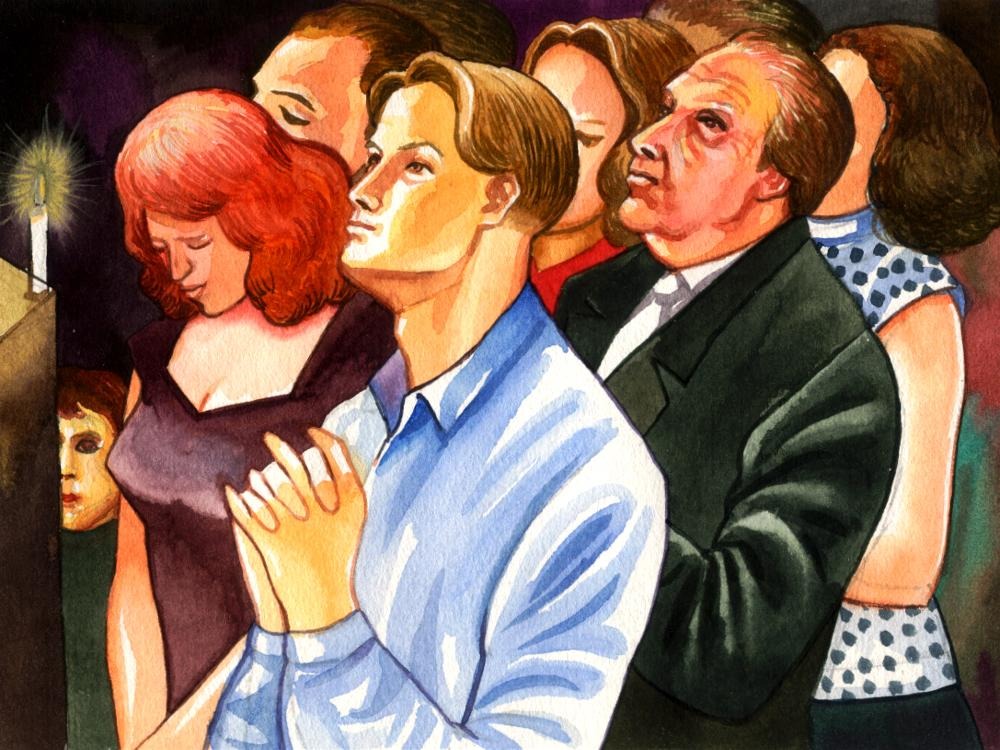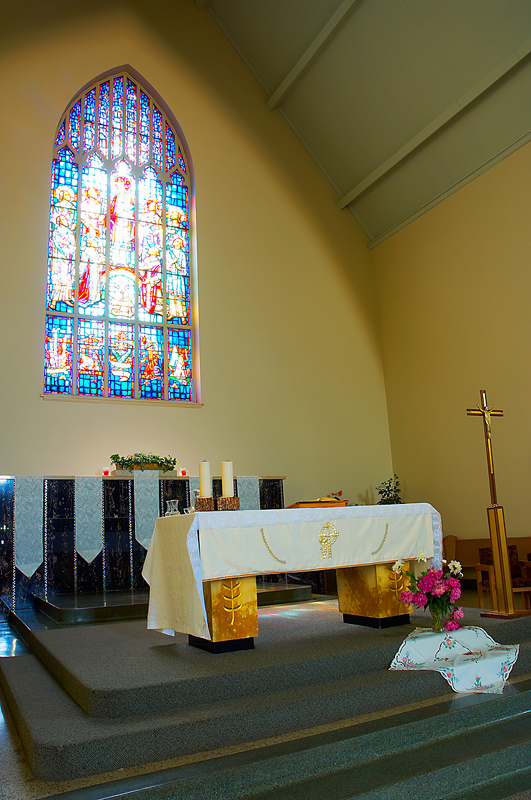Nearly one year ago, Sam Eaton, a millennial from Minneapolis, wrote a blog post detailing “12 reasons millennials are over church.” Since then, he has received thousands of hateful and angry comments. But what he wants Christians to know is that that was his love letter to the American church.
“I got a lot of hate for this,” said Eaton, an elementary school music teacher and founder of a suicide prevention ministry called Recklessly Alive. “I love the church like Christ loved the church. I want to see it prospering and I look around and I see my generation has left.”
Eaton was joined this week by two other millennials to discuss his controversial blog post on “The Table” podcast, hosted by Dr. Darrell Bock, executive director for Cultural Engagement at the Hendricks Center at Dallas Theological Seminary.
Bock invited them to try to better understand what millennials are thinking and why so many are leaving church.
For one, millennials want to be mentored, not preached at.
“Preaching just doesn’t reach our generation like our parents and grandparents. See: millennial church attendance. We have millions of podcasts and Youtube videos of pastors the world over at our finger tips,” Eaton wrote on his 2016 blog.
“Millennials crave relationship, to have someone walking beside them through the muck. We are the generation with the highest ever percentage of fatherless homes. We’re looking for mentors who are authentically invested in our lives and our future. If we don’t have real people who actually care about us, why not just listen to a sermon from the couch?”
Eaton clarified on the podcast that he’s not advising churches to stop preaching the Gospel to the younger generation.
“But if you’re relying on that to drive millennials into your church, it’s just not going to work because if I’m struggling with fear today, I can sit at home with my sweat pants and find 50 sermons by Francis Chan about fear,” he explained. “Yes, keep preaching but also come around us … teach me how to live these things out.”
Millennials not only want to be mentored but they also want to be heard and valued for who they are in a world that says they’re not good enough.
Another reason millennials are “over church” is that they’re sick of hearing about values and mission statements.
“Stop wasting time on the religious mambo jumbo and get back to the heart of the gospel,” Eaton wrote.
Expanding on that, Eaton said this week that though churchgoers need a common mission, they’re not impressed when the church spends more time talking about the mission statement than putting it into action.
Kat L. Armstrong, executive director of Polished, a ministry for young professional women, believes integrity is a big issue among millennials.
“I think millennials are serious about integrity in a way we’ve never seen before,” she said on the podcast. “Let’s have some integrity behind our words.”
Part of that includes serving the “least of these,” Eaton noted.
While many churches schedule countless “church-type activities” such as Bible studies, social functions and planning meetings, very little time is being devoted to helping the poor or least fortunate, Eaton argued.
“I’m not saying we shouldn’t be studying the Word of God; we should be studying that every single day. You should be in a Bible study … [or] in a small group but if that’s it, you’re kinda missing the point of this book (Bible),” he explained.
“I just don’t know how you can read James or Matthew 25, the least of these, and just go back to your normal American life and not live it out.”
Millennials are also tired of the church blaming the culture for everything, Eaton noted.
Nika Spaulding, director of Women’s Equipping and Curriculum at Watermark Church in Dallas, said the young adult generation needs help interpreting the culture.
“Rather than hearing it’s evil and dangerous, help us interpret it,” she said on the podcast. “That kind of teaching requires nuance … to help you navigate this world that is utterly broken and yet has redemptive value throughout it that we can find.”
The church also needs to start addressing controversial issues rather than avoiding it.
Issues include career, education, relationships, marriage, sex, finances, children, purpose, chemicals and body image.
“We don’t like how the world is telling us to live, but we never hear from our church either,” Eaton, who once struggled with suicidal thoughts, lamented.
“Tell us what the Bible says about these issues and then give us some space to wrestle with it ourselves and let us talk to God about what the Bible says,” he said.
Another big issue millennials have with churches is distrust and misallocation of resources.
“Over and over we’ve been told to ‘tithe’ and give 10% of our incomes to the church but where does that money actually go? Millennials, more than any other generation, don’t trust institutions for we have witnessed over and over how corrupt and self-serving they can be,” Eaton wrote.
What millennials want is “painstaking transparency” — such as a document on the church website tracking every dollar, he suggested.
Spaulding noted, “We’re being lectured all the time, ‘you’re living beyond your means’ and then you look at this $5 million debt of a [church] building.”
She said her church has a rule “where if my budget went on the front of the Dallas Morning News, would I be comfortable with that?”
“I think that holds me to a different level of accountability,” she noted. “Would I feel comfortable telling the 20-year-old who gave 10 percent of their $12,000 salary and the 60-year-old who … also gave me 10 percent of their $150,000 salary, am I valuing their contributions?”
According to a 2013 Barna survey, 59 percent of millennials (born between 1984 through 2002) who grew up in the church have dropped out at some point. Over a third said they left because of the church’s irrelevance, hypocrisy and moral failures of its leaders. Meanwhile, two out of 10 said they feel God is missing in church.
Armstrong said she hopes that churches can put “some defenses down” and “take some ownership on this” as they try to bring millennials back to church.
Bock agreed that change is needed.
“How can we preach and teach transformation and then not be willing to change? That doesn’t make sense at all,” he said. “So to be challenged to do better is not something that should threaten the church, it’s something the church should welcome.”
–––––––––––––––––––––––––––––––––––––––––––––––
Consider this. Perhaps if the “church” was being the church instead of simply going to church, as the Bible teaches, more young people might see the validity of gathering together regularly as the Bible instructs.
What was in the mind of the writer of Hebrew that caused him to place this admonition about assembling together after his discussion about the earthy versus heavenly tabernacle, how Yeshua is our Great High Priest, and how the blood of Yeshua is much more efficacious in cleansing us from sin then the sprinkling of animal blood on the mercy seat in the tabernacle?
What’s more, the writer goes on to talk about the saints boldly entering the most holy place of the heavenly sanctuary by way of the blood of Yeshua and being washed by the water of the Word of Elohim.
After this, he admonishes the saints to not forsake assembling together, and so much more so as they see “that Day” (i.e. the day of Yeshua’s coming) approaching.
What does all this have to do with the saints assembling together? It is this: The saints coming together (on the seventh day Sabbath, biblical feasts and any other times) should be a holy of holies experience — the nearest thing to heaven on earth this side of heaven! In as much as the holy of holy, in Hebraic thought, is a prophetic picture of the bridal chamber where YHVH will meet and spiritually commune with his people, by the saints assembling together, they are rehearsing the soon coming reunion between Yeshua and his bride (redeemed believers who love Yeshua by keeping his commandments) at his second coming. This is the larger context behind the admonition to “not forsake the assembling of ourselves together.”
Church attendance is plummeting in America. Though roughly 85 percent of Americans claim to be Christian, only a very small percentage of these people attend church services weekly. Those who do, spend only one or two hours a week in church at the most. Even many Messianics or Hebrew roots-type believers have become victims of these trends. There seems to be a lack of discipline about regular church attendance, and many seldom go if at all. For many, church attendance has become a perfunctory ritual; people feel that they need to go to church, but they’re not sure why they do it.
In Israel in the time of Yeshua and earlier, the synagogue was the heart and soul of each community. It was the place of spiritual and secular education, prayer, fellowship, and acted as a sort of community center. We see that this was the case among the first century redeemed believers as well.
As many of us return to the spiritual and Hebraic roots of the Christian faith, then perhaps we need to reevaluate the role the local congregation played in the lives of our spiritual forefathers, and what the Bible teaches about this to see if our lives are mirroring the Word of Elohim. If not, then we need to ask ourselves some hard questions as to why so many Continue reading →








